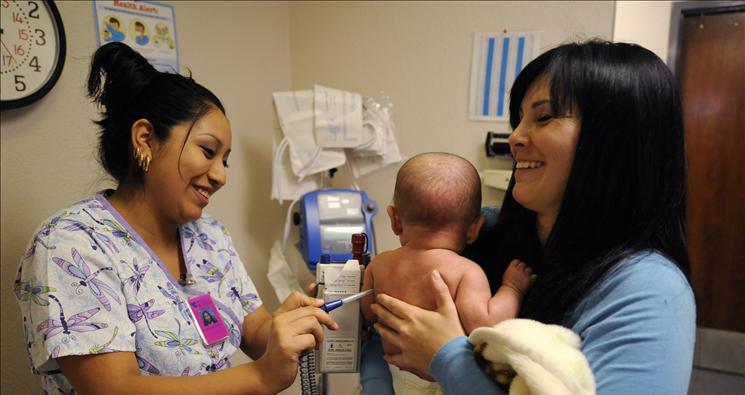A Partial Victory for Pro-Life Pregnancy Centers in New York City
The vile morality of the abortion lobby goes something like this: The “right” of a woman to hire another person to kill her child should not only be as unfettered as possible, it should ideally be subsidized by others. Abortion clinics should be free of even the most basic medical restrictions designed to protect clients from (further) harm, they should be free from any requirement to deliver truthful medical information about the child growing inside the mother, they should be able to perform the procedure at any time up to (and, according to some, just after) birth, and abortion providers themselves are not only entitled to considerable federal and state funding, it’s worth shutting down the government to preserve that funding — all in the name of protecting the “fundamental right” to abort a child.
This love for fundamental rights disappears, however, when it comes to an actual, explicit fundamental constitutional right: Free speech. Earlier this week, the Supreme Court heard arguments in McCullen v. Coakley, a case challenging Massachusetts’s decision to block pro-life free speech that occurs in close proximity to abortion clinics. But such “buffer zones” are not the only challenges to pro-life free speech.
Standing on the front lines against the taxpayer-funded abortion industry are a collection of privately-funded crisis-pregnancy centers. These centers do invaluable work on the ground, often providing women with free ultrasounds, educating them about abortion alternatives, and teaching them about the value of the life. Consequently, the abortion lobby loathes these centers and is constantly seeking ways to limit their freedom of action.
In March 2011, New York City passed Local Law 17, which required “pregnancy services centers” (as vaguely defined) to make three disclosures:
(1) whether or not they “have a licensed medical provider on staff who provides or directly supervises the provision of all of the services at such pregnancy service center” (the “Status Disclosure”);
(2) “that the New York City Department of Health and Mental Hygiene encourages women who are or who may be pregnant to consult with a licensed provider” (the “Government Message”); and
(3) whether or not they “provide or provide referrals for abortion,” “emergency contraception,” or “prenatal care” (the “Services Disclosure”).
Taken together, these disclosures not only commandeer the free-speech rights of the centers by compelling government speech, they act as an effective warning against entry for abortion-minded women — often foreclosing even the opportunity to persuade. At the ACLJ, we challenged these restrictions on First Amendment grounds, winning an injunction at the district court. The court found the definition of “pregnancy services centers” unconstitutionally vague and therefore enjoined the law’s enforcement. The city appealed to the Second Circuit.
This morning, the Second Circuit issued its decision, reversing in part and affirming in part. It disagreed with the district court that the definition of “pregnancy services centers” was vague and also refused to enjoin the Status Disclosure. However, it enjoined both the government message and the services disclosure, holding that these mandated disclosures violated the pregnancy centers’ First Amendment rights. Regarding the government message, the court held:
We are also concerned that this disclosure requires pregnancy services centers to advertise on behalf of the City. It may be the case that most, if not all, pregnancy services centers would agree that pregnant women should see a doctor. That decision, however, as this litigation demonstrates, is a public issue subject to dispute. The Government Message, “mandating that Plaintiffs affirmatively espouse the government’s position on a contested public issue,” deprives Plaintiffs of their right to communicate freely on matters of public concern.
Regarding the services disclosure the court noted:
A requirement that pregnancy services centers address abortion, emergency contraception, or prenatal care at the beginning of their contact with potential clients alters the centers’ political speech by mandating the manner in which the discussion of these issues begins.
Judge Wesley, in a strongly-worded dissent, correctly identified the law’s fatal flaw:
Local Law 17 is a bureaucrat’s dream. It contains a deliberately ambiguous set of standards guiding its application, thereby providing a blank check to New York City officials to harass or threaten legitimate activity.
This is exactly right. While we’re pleased the Second Circuit enjoined two of the three mandated disclosures, the third disclosure also violates our clients’ constitutional rights, and the vague definitions inherent in the statute invite abuse. Stay tuned as we consider an appeal.
If the abortion lobby is confident in its worldview and confident that it truly cares for women, why does it fear debate? Why must it commandeer the power of the state to stifle free speech? After all, isn’t one of the justifications for the abortion-on-demand regime that it honors individual autonomy? What about the autonomy of dissenters?
But abortion isn’t about liberty, and it’s never been about liberty. It’s instead an ideology of individual supremacy maintained by an embrace of death on an industrial scale.
No wonder it seeks to stifle debate.
